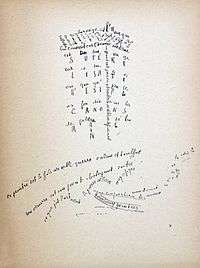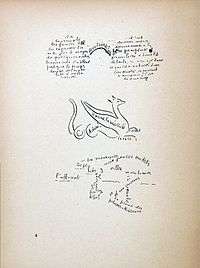Calligrammes
A calligram from Calligrammes

A calligram from Calligrammes[1]

A calligram from Calligrammes
Calligrammes, subtitled Poems of Peace and War 1913-1916, is a collection of poems by Guillaume Apollinaire which was first published in 1918 (see 1918 in poetry). Calligrammes is noted for how the typeface and spatial arrangement of the words on a page plays just as much of a role in the meaning of each poem as the words themselves - a form called a calligram. In this sense, the collection can be seen as either concrete poetry or visual poetry. Apollinaire described his work as follows:
The Calligrammes are an idealisation of free verse poetry and typographical precision in an era when typography is reaching a brilliant end to its career, at the dawn of the new means of reproduction that are the cinema and the phonograph. (Guillaume Apollinaire, in a letter to André Billy)[2]
Notes
- ↑ Action: Cahiers Individualistes De Philosophie Et D’art, October 1920, Blue Mountain Project, Princeton University
- ↑ Apollinaire, Guillaume, quoted in the preface by Michel Butor. Calligrammes, p. 7 (Éditions Gallimard, preface copyright 1966).
References
- Apollinaire, Guillaume. Calligrammes. Preface by Michel Butor. (Éditions Gallimard, 1995) ISBN 2-07-030008-0
External links
- Calligrammes; poèmes de la paix et da la guerre, 1913-1916 digitized original at the Internet Archive
- Calligrammes (full text)
This article is issued from Wikipedia - version of the 10/29/2015. The text is available under the Creative Commons Attribution/Share Alike but additional terms may apply for the media files.







